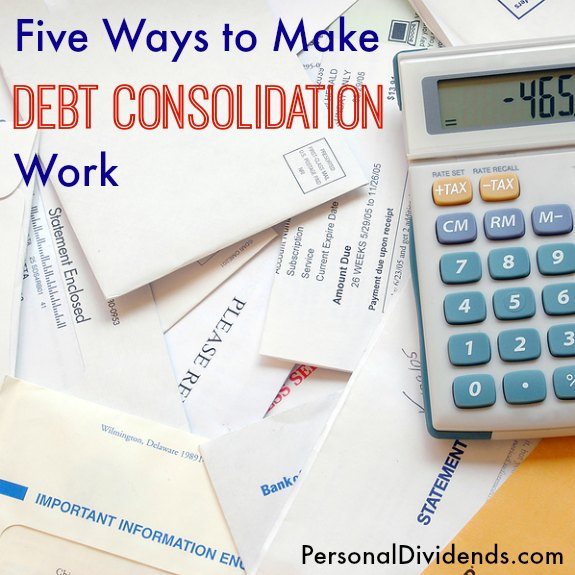- 4shares
- Twitter1
- Pinterest3
- Google+
Most of the time when people attempt to take debt consolidation loans, they fail miserably. They do for reasons that are too involved to cover here. But there are ways to make debt consolidation work, and here are at least five of them.

1. Treat it as a voluntary bankruptcy
If you end up in bankruptcy as a result of having too much debt, the court will establish the terms of any necessary repayment, as well as the resolution of debt that you are unable to pay. You should treat a debt consolidation loan as though it were a bankruptcy, but one where you have an opportunity to control how it plays out.
That means that you should approach the debt consolidation loan with the same intensity that you would for a court-ordered bankruptcy. You should be absolutely religious about making required monthly payments, as well as to pay it off as soon as possible.
The analogy of treating a debt consolidation loan as a voluntary bankruptcy is more than just a casual suggestion. For many people having to undertake a debt consolidation loan, it can be the last step before filing for bankruptcy. Should the debt consolidation loan fail to help you get control of your debt, bankruptcy may be the only option available. In fact, many people who file for bankruptcy have a history of serial debt consolidation loans. Don’t be one of them!
2. Pay if off as soon as possible
Just like a bankruptcy, a debt consolidation loan is not something you want to spend a lot of time with. This means that you should never get too comfortable with a debt consolidation arrangement. The point of such a loan is always to pay it off as soon as possible.
This is important on several fronts. If you get too comfortable with a debt consolidation loan, it will become normal in your life. When that happens, the whole purpose of the loan may be lost. A debt consolidation loan should always be treated as a special loan, for a very specific purpose, and to address a significant problem in your life.
Another consideration – one that is even more important – is that while you’re paying the debt consolidation loan, life is still happening all around you. That means that financial problems are developing that will require capital to address. If you are tied up paying your debt consolidation loan, you may not have the cash available to deal with the latest emergency.
3. Don’t Take On ANY New Debt During the Consolidation
If you take a debt consolidation loan, it’s very important that you do not take any additional debt until the consolidation loan is paid in full.
Since the purpose of a debt consolidation loan is to relieve you of a debt problem, the very last thing you need to be doing is stacking fresh debt on top of the consolidation loan. If you do that, then the debt consolidation loan is no longer about debt consolidation – it’s just another loan among others.
While you’re paying down the debt consolidation loan, the fresh debt is replacing the principal paid on the consolidation. You won’t be making any progress, and the whole purpose of the debt consolidation loan will disappear.
4. Increase Your Income While You’re Paying the Debt Consolidation Loan
One of the primary reasons why people incur debt, especially in large amounts, is that their income is insufficient to cover their cost of living. For this reason, it’s important that you address that problem while you’re paying off your debt consolidation loan.
You want to emerge from the loan in a better financial position than when you went in. While the debt consolidation loan will address the excess levels of debt, increasing your income will provide you with more money to save, so that you won’t have to use credit to pay your obligations.
5. Try to Save Some Money While You’re Paying Off the Debt Consolidation Loan
Depending upon the size of your monthly debt consolidation loan payment, you may or may not be in a position to save money. But if you are at all in a position to do so, you should save as much money as possible. You should do this even if it means that you have to make cuts in other expenses in your budget.
Next to insufficient income, probably the biggest driver of debt is a lack of cash. People tend to use credit when they don’t have cash, which eventually leads to too much debt.
Do your best to build up at least some cash savings, that way by the time your debt consolidation loan is paid, you’ll be able to rely on cash rather than going back to using credit. It’s one of the best ways to ensure that you never get deep in debt again.
Kevin Mercadante is professional personal finance blogger, and the owner of his own personal finance blog, OutOfYourRut.com. He has backgrounds in both accounting and the mortgage industry. He lives in Atlanta with his wife and two teenage kids and can be followed on Twitter at @OutOfYourRut.
